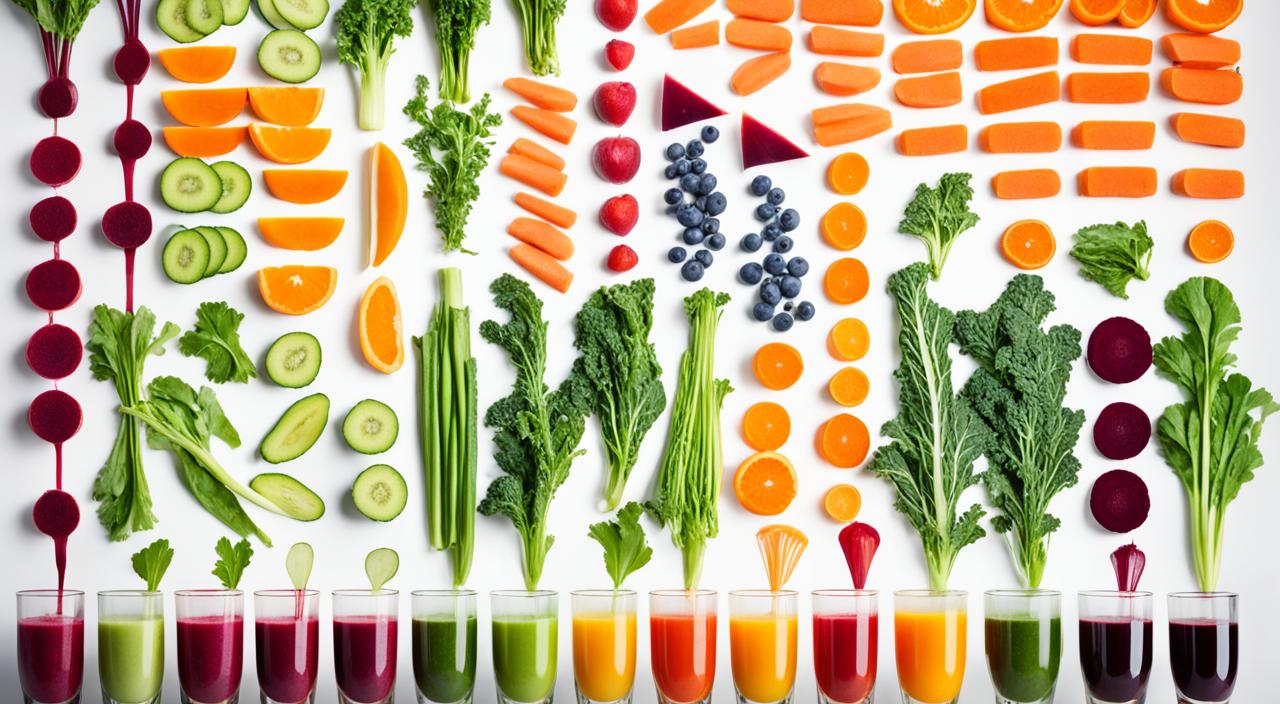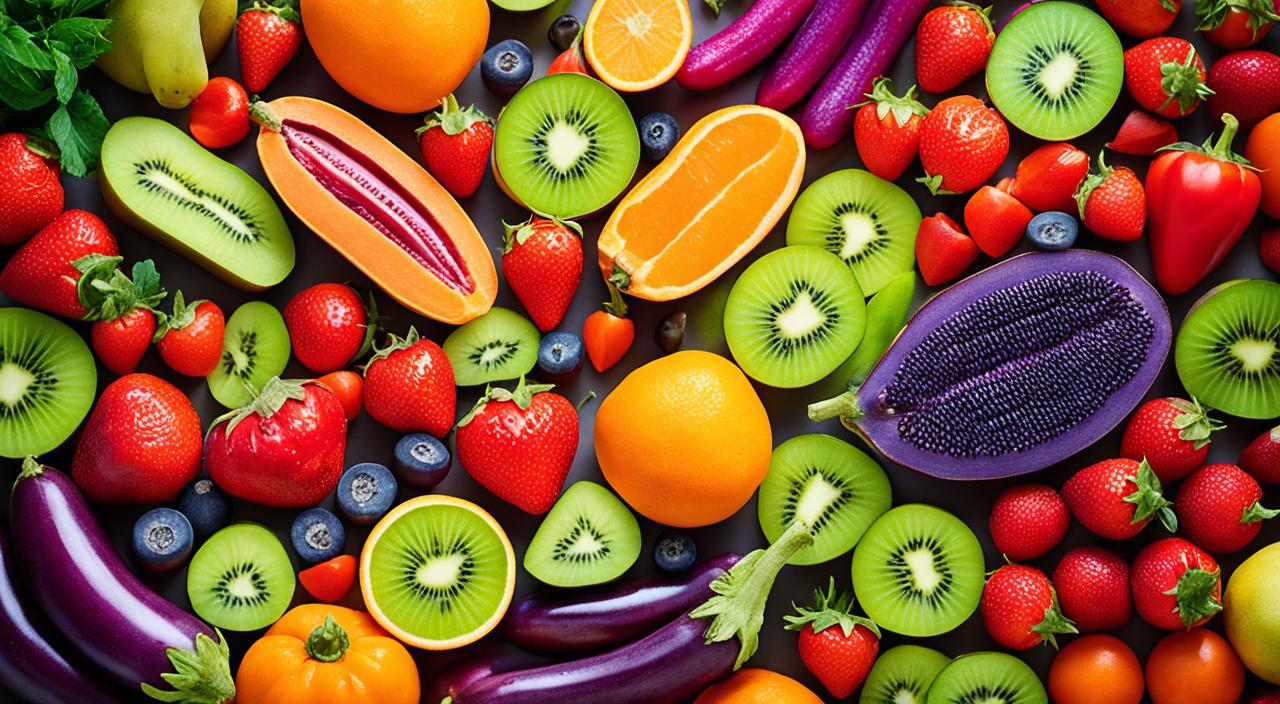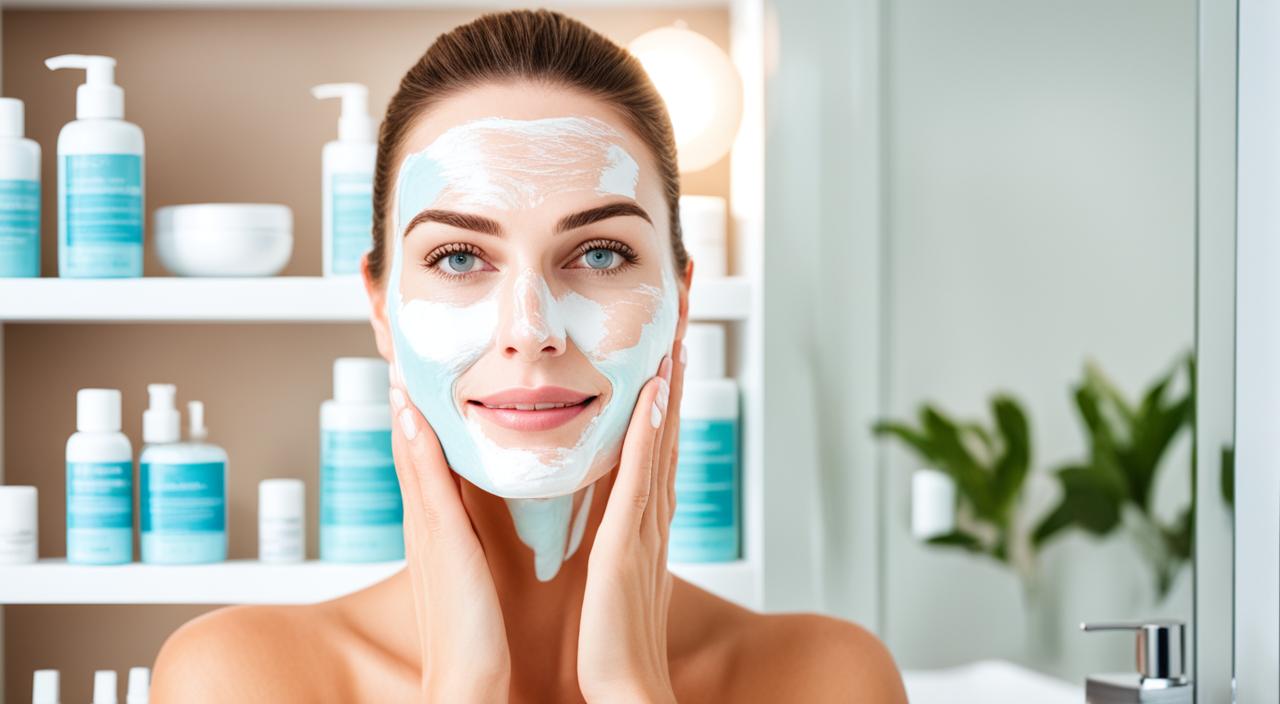How Skincare Diets Can Transform Your Complexion
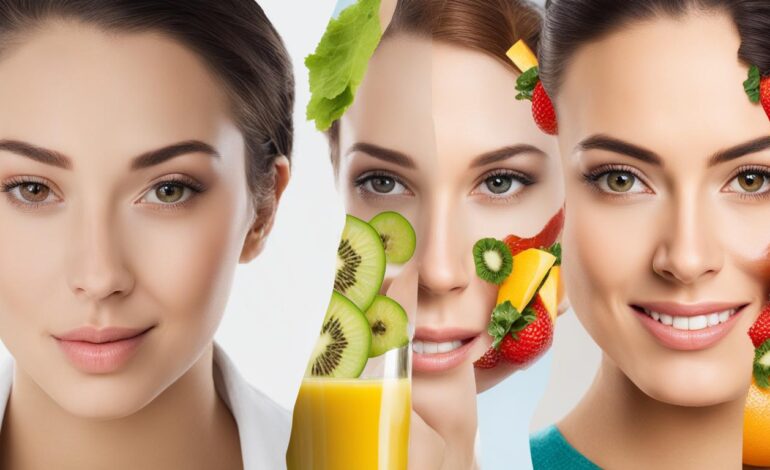
Skincare Diets Can Transform Your Complexion : Skincare diets are not just a trendy fad; they are a powerful tool that can genuinely transform your complexion. While skincare products are commonly used, many of us overlook the crucial role that nutrition plays in achieving healthy, glowing skin. The food we consume provides essential nutrients that promote skin repair and maintenance, ensuring that our skin looks and feels its best.
By making dietary changes and adopting a skincare diet tailored to your specific needs, you can significantly improve the health and appearance of your skin. In this article, we will delve into the fascinating connection between nutrition and skin health. You will learn how certain nutrients can nourish your skin from within, while also discovering foods to embrace and those to avoid for a radiant complexion.
Key Takeaways:
- Skincare diets have the power to transform your complexion and enhance skin health.
- Nutrition plays a crucial role in repairing and maintaining healthy skin.
- Key nutrients like vitamins A, C, and E, zinc, and antioxidants are essential for glowing skin.
- Incorporating fruits, vegetables, healthy fats, lean protein, and whole grains can promote healthy skin.
- Avoiding sugar, refined carbohydrates, processed foods, saturated fats, and trans fats can benefit your skin.
The Science Behind Skin Health
Before delving into the impact of nutrition on skin health, it’s important to understand the structure of the skin. The skin is the largest organ in the body and consists of the epidermis, dermis, and subcutaneous tissue.
“The skin is the body’s largest organ, accounting for about 16 percent of our total body weight.”
The epidermis is the outermost layer of the skin and acts as a protective barrier against external factors. It plays a vital role in preventing water loss and shielding the body from harmful pathogens and UV radiation.
Beneath the epidermis lies the dermis, which contains blood vessels, hair follicles, and sweat glands. The dermis provides structural support and elasticity to the skin, giving it its firm and youthful appearance.
Finally, the subcutaneous tissue, also known as the hypodermis, is composed of fat cells that help insulate the body and regulate temperature.
“Understanding the different layers of the skin is crucial in comprehending how skincare and nutrition can impact skin health.”
Various factors can influence skin health, including genetics, age, sun exposure, and lifestyle habits. Genetic predispositions can determine factors such as skin type, oil production, and susceptibility to certain conditions like acne or eczema.
Over time, the natural aging process leads to a decrease in collagen and elastin production, resulting in wrinkles and loss of skin elasticity. Sun exposure plays a significant role in premature aging, as ultraviolet (UV) radiation damages the skin’s DNA and collagen fibers.
Lifestyle habits, such as smoking, poor nutrition, and inadequate sleep, can also impact skin health. Smoking reduces blood flow to the skin, leading to a dull complexion and increased wrinkles. Nutrition, including both what we consume and what we lack, has a profound effect on the health and appearance of our skin.
“The skin is a dynamic organ that is influenced by a combination of internal and external factors.”
| Factors Affecting Skin Health | Impact on Skin Health |
|---|---|
| Genetics | Determines skin type, oil production, and susceptibility to certain conditions. |
| Age | Results in decreased collagen and elastin production, leading to wrinkles and loss of elasticity. |
| Sun Exposure | UV radiation damages the skin’s DNA and collagen fibers, causing premature aging. |
| Lifestyle Habits | Smoking, poor nutrition, and inadequate sleep can negatively impact skin health. |
Nutrients for Skin Health
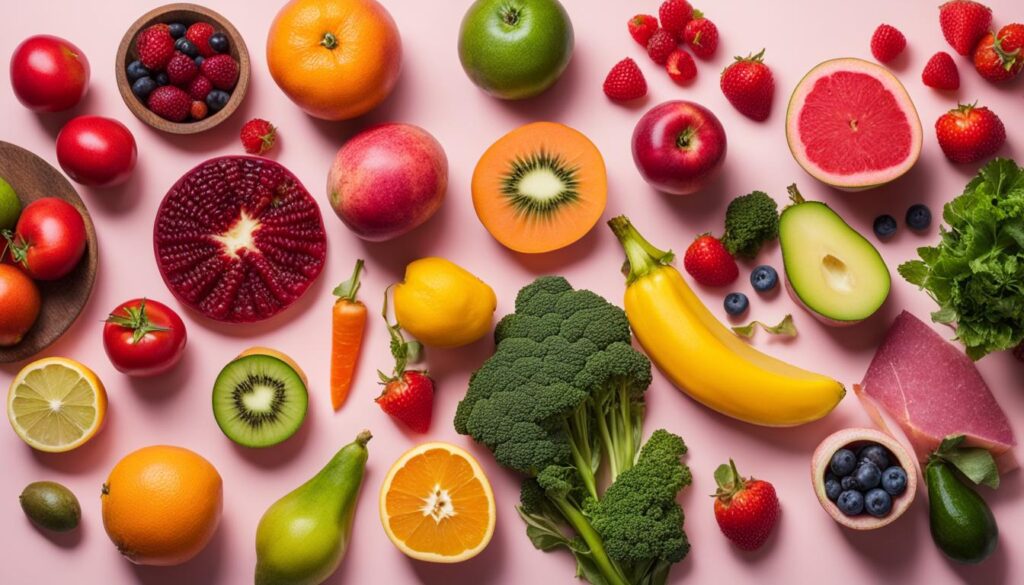
Certain nutrients are essential for maintaining healthy skin. By incorporating these nutrients into your diet, you can support the repair, protection, and overall health of your skin.
Vitamin A: Vitamin A plays a vital role in skin repair and maintenance. It helps to promote cell turnover, keeping the skin youthful and vibrant. Foods rich in vitamin A include carrots, sweet potatoes, spinach, and kale.
Vitamin C: Vitamin C is a powerful antioxidant that helps protect the skin from free radical damage. It also supports collagen production, which keeps the skin firm and elastic. Citrus fruits, berries, bell peppers, and broccoli are excellent sources of vitamin C.
Vitamin E: Like vitamin C, vitamin E is an antioxidant that helps shield the skin from free radicals. It also promotes healthy skin cell growth, contributing to a smooth and supple complexion. Almonds, sunflower seeds, spinach, and avocado are all good sources of vitamin E.
Zinc: Zinc is a mineral that plays a crucial role in regulating oil production and reducing inflammation in the skin. It is particularly beneficial for those with acne-prone skin. Oysters, beef, pumpkin seeds, and chickpeas are all rich in zinc.
Selenium: Selenium is another potent antioxidant that helps protect the skin from damage caused by the sun and environmental pollutants. It can be found in Brazil nuts, seafood, tofu, and brown rice.
Antioxidants: In addition to specific vitamins, antioxidants found in fruits and vegetables safeguard the skin from free radical damage. Berries, leafy greens, tomatoes, and sweet potatoes are all excellent sources of antioxidants.
Water: Proper hydration is crucial for maintaining skin health. Drinking an adequate amount of water helps flush out toxins, keeps the skin hydrated, and improves its overall appearance. Aim to drink at least eight glasses of water a day to keep your skin well-hydrated and supple.
By incorporating these essential nutrients into your diet and staying properly hydrated, you can proactively support the health and vitality of your skin.
Foods for Healthy Skin
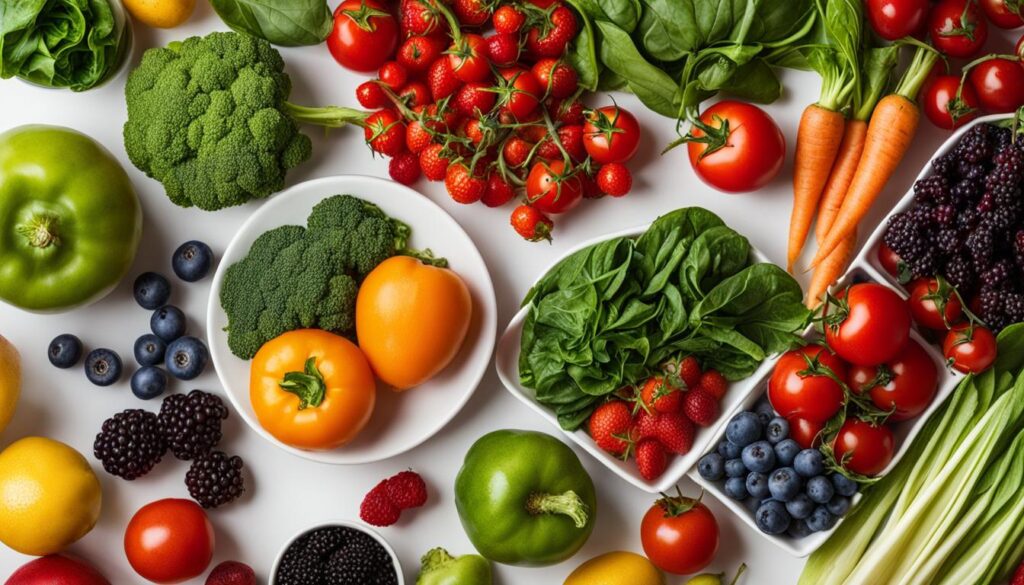
Incorporating certain foods into your diet can promote healthy skin. The right nutrition is essential for nourishing your skin and achieving a glowing complexion. By including a variety of fruits and vegetables, healthy fats, lean proteins, and whole grains in your meals, you can provide your skin with the necessary nutrients it needs to thrive.
Fruits and Vegetables
Fruits and vegetables are packed with vitamins, minerals, and antioxidants that are beneficial for your skin. These nutrient powerhouses help repair and protect your skin from damage caused by free radicals. Aim to incorporate a colorful array of fruits and vegetables into your daily diet to ensure you’re getting a wide range of these skin-loving nutrients.
Healthy Fats
Healthy fats, such as those found in salmon, avocado, and nuts, are crucial for maintaining hydrated and supple skin. These fats help strengthen the skin’s barrier, reducing water loss and preventing dryness. Including healthy fats in your diet can also help reduce inflammation, which is often associated with skin conditions like acne and eczema.
Lean Protein
Lean protein sources like chicken, fish, beans, and lentils play a vital role in skin cell growth and repair. Protein is necessary for collagen production, a protein fiber that provides structure and elasticity to the skin. Making sure you consume enough lean proteins can help keep your skin firm and resilient.
Whole Grains
Whole grains, such as quinoa, brown rice, and oats, are rich in fiber, vitamins, and minerals that support skin health. These nutrient-dense grains help reduce inflammation in the body, including the skin. By decreasing inflammation, whole grains can contribute to a clearer complexion and healthier skin overall.
Incorporating these foods into your diet can provide your skin with the essential nutrients it needs to thrive. Remember, a holistic approach to skincare includes nourishing your body from within.
Achieving healthy skin goes beyond just skincare products. A well-rounded diet filled with fruits, vegetables, healthy fats, lean proteins, and whole grains can contribute to a radiant complexion. Consider using the table below as a guide for incorporating these skin-loving foods into your meals:
| Fruits and Vegetables | Healthy Fats | Lean Protein | Whole Grains |
|---|---|---|---|
| Blueberries | Avocado | Chicken | Quinoa |
| Oranges | Salmon | Fish | Brown Rice |
| Kale | Almonds | Beans | Oats |
| Spinach | Walnuts | Lentils | Whole Wheat Bread |
By including these foods in your diet, you can nourish your skin from the inside out and enjoy the benefits of a healthy and radiant complexion.
Foods to Eat for Specific Nutrients
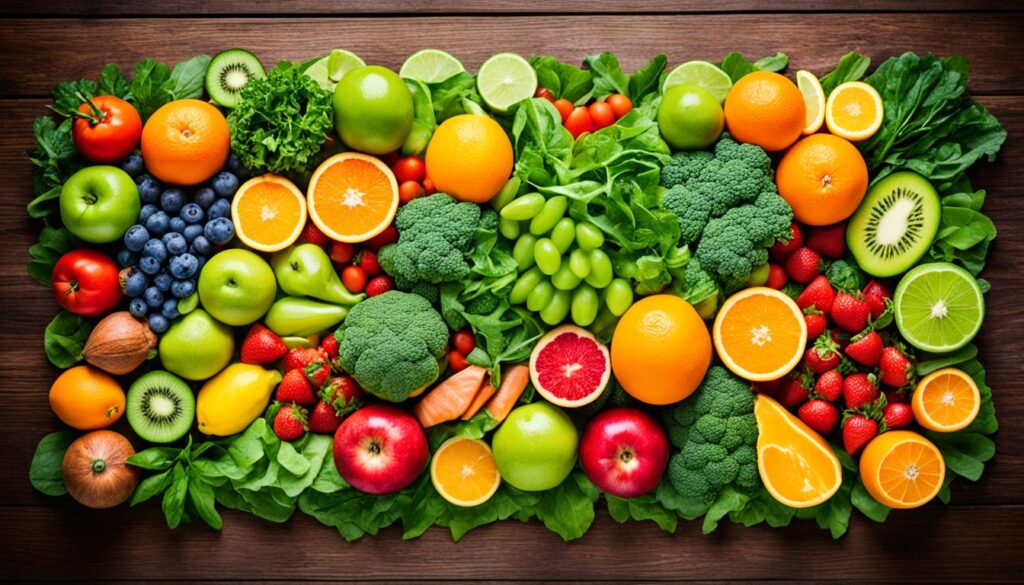
To ensure optimal skin health, it is important to consume foods rich in specific nutrients. Incorporating these nutrient-rich foods into your diet can help improve your skin’s appearance and maintain its overall health.
Omega-3 Fatty Acids
Omega-3 fatty acids are essential for reducing inflammation and improving certain skin conditions like acne and eczema. Include foods such as fatty fish (like salmon and mackerel), chia seeds, and walnuts in your diet to increase your omega-3 fatty acid intake.
Vitamin C
Vitamin C is a powerful antioxidant that protects the skin from free radical damage and promotes collagen production. Incorporate foods high in vitamin C, such as citrus fruits (like oranges and grapefruits), strawberries, and bell peppers, into your daily meals.
Zinc
Zinc plays a crucial role in regulating oil production and reducing inflammation, making it beneficial for acne-prone skin. Foods like oysters, beef, and beans are excellent sources of zinc and can be included in your diet to support healthy skin.
Antioxidants
Consuming foods rich in antioxidants helps protect the skin from free radical damage. Berries (such as blueberries and raspberries), leafy greens (like spinach and kale), and sweet potatoes are all great choices to incorporate into your meals for their antioxidant properties.
Water
Proper hydration is essential for healthy skin function. Drinking an adequate amount of water throughout the day helps maintain the skin’s moisture balance and promotes a healthy complexion. Remember to hydrate your skin from the inside out by consuming enough water daily.
Foods to Eat for Specific Nutrients
| Nutrient | Foods |
|---|---|
| Omega-3 Fatty Acids | Fatty fish (salmon, mackerel), chia seeds, walnuts |
| Vitamin C | Citrus fruits (oranges, grapefruits), strawberries, bell peppers |
| Zinc | Oysters, beef, beans |
| Antioxidants | Berries (blueberries, raspberries), leafy greens (spinach, kale), sweet potatoes |
| Water | Drinking water |
The Importance of Hydration
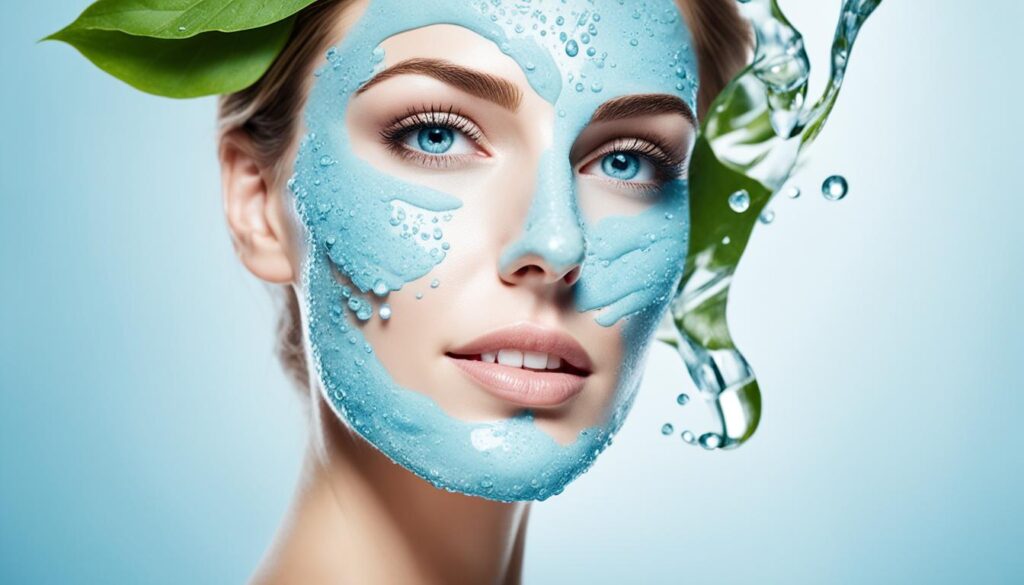
Hydration plays a vital role in maintaining healthy skin. Proper hydration not only improves the appearance of your skin but also enhances its overall function. The skin acts as a protective barrier against environmental stressors, and adequate hydration helps it maintain its plumpness and vitality.
One of the simplest ways to hydrate your skin is by drinking an adequate amount of water. Water keeps your skin moisturized from the inside out, ensuring that it remains supple and radiant. Aim to drink at least eight glasses of water per day to reap the benefits of hydration.
In addition to drinking water, using a moisturizer with hydrating ingredients can further enhance skin hydration. Look for products that contain ingredients like hyaluronic acid or glycerin, as these help attract and retain moisture in the skin, keeping it hydrated throughout the day.
Another way to boost hydration levels in your skin is by incorporating water-rich foods into your diet. Fruits and vegetables such as watermelon, cucumber, strawberries, and oranges have high water content and provide additional hydration for your skin. These foods not only contribute to your overall hydration but also deliver essential vitamins and antioxidants that promote skin health.
The Benefits of Hydration:
When your skin is properly hydrated, you can experience a range of benefits:
- Improved skin elasticity and plumpness
- Reduced appearance of fine lines and wrinkles
- Enhanced natural glow and radiance
- Improved skin texture and smoothness
- Protection against environmental damage
- Quicker healing of blemishes and wounds
By prioritizing hydration through water consumption, moisturizer application, and water-rich foods, you can support the health and appearance of your skin.
Foods to Avoid

While maintaining a healthy diet is important for promoting skin health, it’s equally crucial to be aware of the foods that can have a negative impact on your complexion. By avoiding certain foods, you can minimize the risk of skin issues and maintain a radiant appearance.
1. Sugar
Eating excessive amounts of sugar can lead to increased inflammation in the body, which can contribute to skin problems such as acne and premature aging. Opt for healthier alternatives like fresh fruits to satisfy your sweet tooth.
2. Refined Carbohydrates
Refined carbohydrates, such as white bread, pasta, and pastries, have a high glycemic index, which means they can cause a rapid spike in your blood sugar levels. This can lead to inflammation and skin issues. Choose whole grains instead for a healthier option.
3. Processed Foods
Processed foods often contain high amounts of salt, sugar, and unhealthy fats. Consuming these foods can contribute to inflammation in the body and negatively impact your skin. Opt for whole, unprocessed foods to promote healthier skin.
4. Saturated Fats
Consuming excessive amounts of saturated fats, which are commonly found in red meat, full-fat dairy products, and fried foods, can clog pores and contribute to acne breakouts. Choose lean protein sources and healthier fats like avocado and olive oil instead.
5. Trans Fats
Trans fats are artificial fats often found in fried foods, baked goods, and margarine. These fats can increase inflammation in the body and have been linked to various skin issues. It’s best to avoid them altogether for the sake of your skin and overall health.
By being mindful of your food choices and limiting your intake of foods high in sugar, refined carbohydrates, processed ingredients, saturated fats, and trans fats, you can help support healthier, clearer, and more vibrant skin.
Skincare Myths
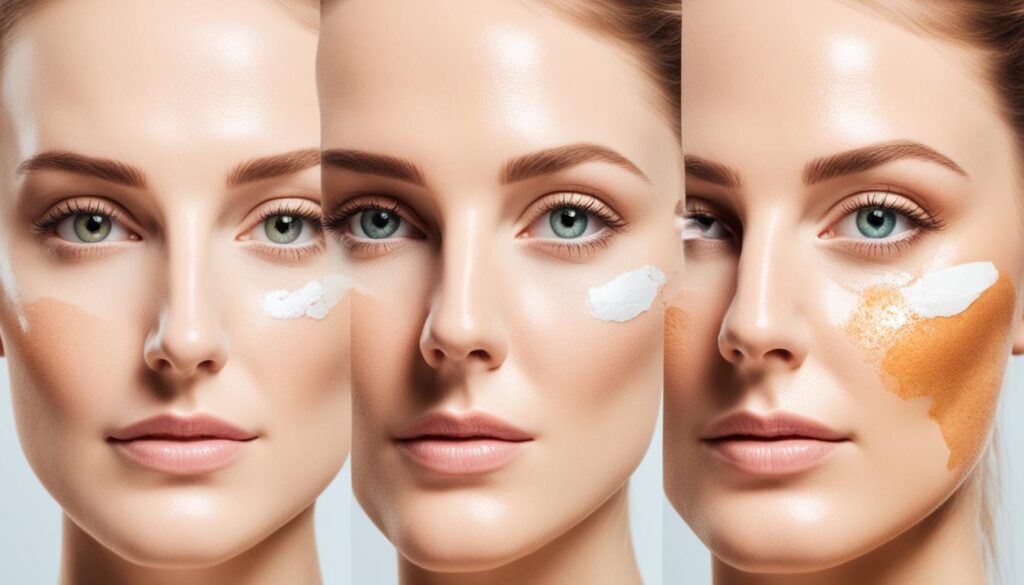
Despite the abundance of information available on skincare, there are several persistent myths that need to be debunked. Let’s separate fact from fiction and set the record straight on these skincare misconceptions.
Myth 1: Greasy Foods Cause Acne
Contrary to popular belief, greasy foods themselves do not directly cause acne. However, there is a link between consuming greasy foods and the inflammation they can trigger, which can contribute to breakouts. It’s essential to maintain a balanced diet and manage overall inflammation to promote healthy skin.
Myth 2: Chocolate Causes Acne
While the consumption of chocolate itself does not directly cause acne, the added sugar and milk often found in chocolate products may worsen skin issues. Excessive sugar intake can lead to inflammation, which can exacerbate acne. Moderation and opting for dark chocolate with lower sugar content can be a better choice for those concerned about their skin.
Myth 3: Tanning is Good for the Skin
Contrary to the belief that tanning can improve skin health, it is actually detrimental to the skin. Tanning damages the skin cells and can lead to premature aging, wrinkles, and an increased risk of skin cancer. Protecting your skin from harmful UV rays and maintaining a healthy skincare routine are crucial for optimal skin health.
Myth 4: Natural Skincare Products are Always Better
The idea that natural skincare products are superior to synthetic ones is a common misconception. Both natural and synthetic skincare products can be safe and effective when formulated properly. The key is to look for products that suit your skin type and address your specific skincare needs, regardless of whether they are natural or synthetic.
Myth 5: Exfoliating Daily is Good for Your Skin
Exfoliating is a beneficial skincare practice, but doing it daily can actually be detrimental to the health of your skin. Over-exfoliation can strip away the skin’s natural oils, disrupt the skin barrier, and cause irritation. It’s important to exfoliate in moderation, following the recommended frequency for your skin type and using gentle exfoliants that won’t be too harsh on your skin.
Debunking these skincare myths can help you make informed decisions about your skincare routine. Remember to rely on scientific evidence and consult with skincare professionals for personalized advice that suits your unique needs.
| Skincare Myths | Fact |
|---|---|
| Greasy foods cause acne | False |
| Chocolate causes acne | False |
| Tanning is good for the skin | False |
| Natural skincare products are always better | False |
| Exfoliating daily is good for your skin | False |
How Diet Affects Skin Health
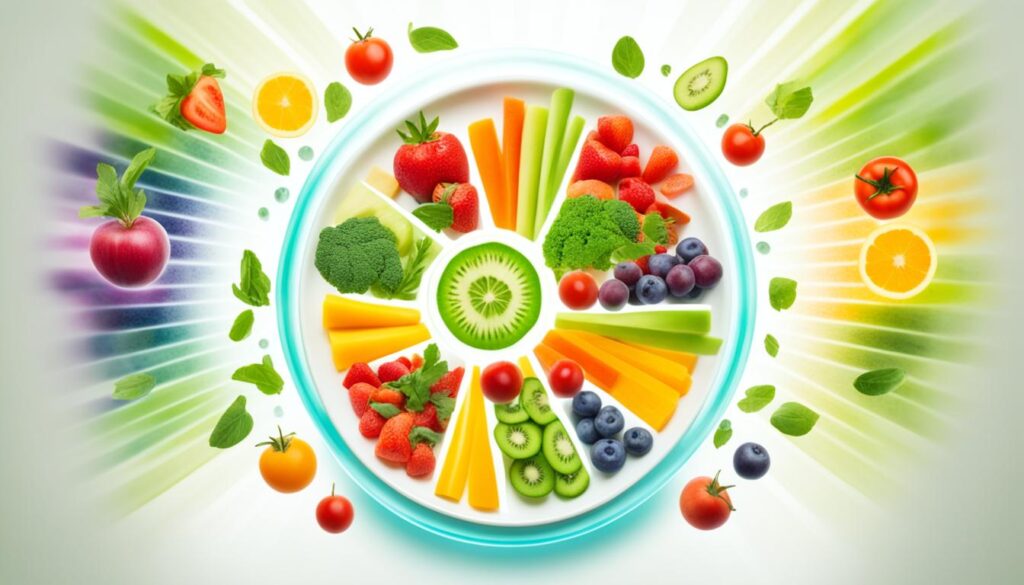
Your diet plays a crucial role in maintaining healthy skin. What you eat directly impacts the condition and appearance of your skin. By making mindful dietary choices, you can provide your skin with the nutrients it needs to thrive.
Eliminating Reactive Foods
Certain foods, such as sugar and dairy, can trigger skin issues like acne and inflammation. By reducing or eliminating these foods from your diet, you can improve the overall health of your skin.
Increasing Fat Intake
Healthy fats, found in foods like avocado and olive oil, are essential for skin hydration and preventing inflammation. Incorporating these fats into your diet can improve your skin’s health and appearance.
Adding Color to the Diet
Colorful fruits and vegetables provide essential antioxidants that protect your skin from free radical damage. By adding a variety of colors to your diet, you can support healthy skin.
Reducing Sugar Intake
Excessive sugar consumption can lead to the formation of advanced glycolated end products (AGEs), which can decrease skin elasticity. By reducing your sugar intake, you can promote healthier and more youthful-looking skin.
Protein for Collagen Production
Protein is crucial for collagen production, which is essential for maintaining skin elasticity and firmness. Include lean sources of protein like fish, chicken, and beans in your diet to support collagen synthesis.
Hydration through Water Consumption
Proper hydration is crucial for healthy skin. Drinking an adequate amount of water keeps your skin hydrated and helps maintain its natural moisture balance. Aim to drink at least eight glasses of water per day.
Choosing Appropriate Supplements
In some cases, it may be beneficial to supplement your diet with vitamins and minerals to fill nutrient gaps and support skin health. Consult with a healthcare professional to determine which supplements are appropriate for you.
By paying attention to your diet and making thoughtful choices, you can improve the health and appearance of your skin. Remember that everyone’s skin is unique, so it’s important to find what works best for you.
Lifestyle Factors for Healthy Skin
In addition to diet, lifestyle factors have a significant impact on maintaining healthy skin. Incorporating specific habits into your daily routine can promote blood circulation, improve skin health, and enhance the overall appearance of your complexion.
Burst Training and Weight Resistance
Burst training, also known as high-intensity interval training (HIIT), involves short bursts of intense exercise followed by brief recovery periods. This type of exercise not only helps burn calories and improve cardiovascular fitness but also promotes blood circulation throughout the body, including the skin. Increased blood flow delivers vital nutrients and oxygen to the skin, stimulating cell turnover and giving your complexion a healthy glow.
Weight resistance exercises, such as lifting weights or using resistance bands, help build muscle strength and tone. These exercises benefit the skin by increasing collagen production, improving elasticity, and reducing the appearance of fine lines and wrinkles. Strong and toned muscles also provide support to the skin, helping to maintain its firmness and youthful appearance.
Quality Sleep
Getting enough quality sleep is essential for maintaining healthy skin. During sleep, your body repairs and regenerates cells, including skin cells. Lack of sleep can lead to increased stress levels, which can contribute to skin issues like acne and eczema. Aim for a minimum of eight hours of uninterrupted sleep each night to allow your body to heal and rejuvenate.
Incorporate Lifestyle Factors for Maximum Benefits
While a nutritious diet forms the foundation for healthy skin, incorporating lifestyle factors such as burst training, weight resistance exercises, and quality sleep can amplify the benefits of your skincare routine. Proper blood circulation, muscle strength, and sufficient rest contribute to an overall healthy complexion.
| Lifestyle Factors for Healthy Skin | Burst Training | Weight Resistance | Quality Sleep |
|---|---|---|---|
| Promotes blood circulation | ✅ | ✅ | ❌ |
| Improves skin health | ✅ | ✅ | ❌ |
| Enhances complexion | ✅ | ✅ | ❌ |
| Increases collagen production | ❌ | ✅ | ❌ |
| Reduces fine lines and wrinkles | ❌ | ✅ | ❌ |
| Maintains firmness and elasticity | ❌ | ✅ | ❌ |
| Supports skin cell regeneration | ❌ | ❌ | ✅ |
Note: ✅ indicates a positive impact, while ❌ indicates no impact.
By paying attention to both your diet and lifestyle choices, you can optimize the health and appearance of your skin, achieving a radiant and youthful complexion.
Conclusion
Skincare diets offer a transformative approach to achieving a glowing complexion and promoting overall skin health. By understanding the science behind nutrition and its impact on the skin, incorporating specific nutrient-rich foods, and avoiding detrimental ones, you can unlock the key to optimal skin health.
In addition to proper nutrition, hydration, adequate sleep, and lifestyle factors also play crucial roles in attaining a radiant complexion. Remember, skincare diets are not a one-size-fits-all solution. It’s essential to find the approach that works best for your unique needs and preferences.
Embrace the power of nutrition for your skin and reap the benefits of a healthy, glowing complexion. By prioritizing skincare diets and adopting healthy habits, you can nourish your skin from within, enhancing its appearance, and promoting long-term skin health.
Also Refer : 10 Foods To Add To Your Diet For A Healthy Glow
FAQs
Q: How can certain foods affect your skin?
A: Certain foods can either improve your skin or cause skin problems, so your diet plays a crucial role in maintaining healthy skin.
Q: What are the benefits of a skin care diet?
A: A skincare diet can transform your complexion, improve your skin, and help with common skin concerns such as acne and aging.
Q: What role does diet play in improving your skin?
A: Diet plays an important role in skin health as certain foods can help your skin stay healthy and protect it from free-radical damage.
Q: How can food groups contribute to healthier skin?
A: Different food groups provide essential nutrients that have a positive effect on your skin’s function and appearance, promoting healthy skin at any age.
Q: Why is diet important for healthy skin?
A: Eating a balanced diet with whole foods is important as it can keep your skin healthy, protect it from damage, and address skin concerns like acne and other skin issues.
Q: Can a certain diet help with skin aging?
A: Yes, a diet high in nutrients and antioxidants can help protect your skin from aging and keep it youthful and healthy.
Q: What is the importance of diet and skincare in addressing skin concerns?
A: Eating a diet that considers skin concerns and using appropriate skincare products can have a positive impact on your skin’s function and appearance.

